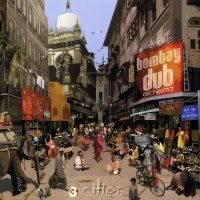 |
| NetLab · Rules · Torrent Tracker · Have a problem? · Eng/Rus |
 Help Help
 Search Search
 Members Members
 Gallery Gallery
 Calendar Calendar
|
| Welcome Guest ( Log In | Register | Validation ) | Resend Validation Email |
|
Posted: 31-03-2009, 20:18
(post 1, #887971)
|
||||||||||||||||||||||||
|
Pro Member Group: News makers Posts: 578 Warn:0% |
|
||||||||||||||||||||||||
|
|||||||||||||||||||||||||
|
Posted: 31-03-2009, 20:18
(post 2, #887972)
|
||
|
Pro Member Group: News makers Posts: 578 Warn:0% |
While the relationship between India and reggae is centuries old-well, at least the cultural and social processes that lead to what would become Jamaica's largest export in the '60s and beyond-it's taken a while for musicians to make the link between. Bombay Dub Orchestra producers Garry Hughes and Andrew T. Mackay sought out the cross-continental sonic connection a few years back with their two-disc debut, using lightly polished electronica as the middle ground between sweeping and soaring cinematic strings and the heavier, headier resonance of the dub low end. On their follow-up, less is more: it's only one album this time, but damn it's packed. Keeping true to the nature of dub, they turn the bass louder than last time, which gives each song a more grounded feel; this in turn allows the violins and flutes (they recorded with filmi composer AR Rahman's highly respected musicians) to have that much more of an ethereal, lofty quality. Indian music has always been concerned with Natraj's dance-the interplay between seemingly opposed forces-and within the folds of paradox, Bombay Dub has found that delicate balance few in the global electronica scene touches. It makes since, given how busy they've been, remixing efforts by Bebel Gilberto, Gaudi + Nusrat Fateh Ali Khan, Bob Marley, and an absolutely crushing take on Persian singer Azam Ali's "Abode." Tasting and touching these worldly influences may have helped them formulate a more dense and lush landscape which to create 3 Cities upon. The cinematic effects are everywhere-the grand violin sections on "Junoon" and the piano/zither play on "Amina" are soundtrack quality, helping to create epic Mahabharata-sized visions in your mind's eye. Yet there is a harder edge here, especially with the serpentine tablas of "Spiral," with its determined drum beat and poignant vocals. (In America, musicians reinterpreting Indian music often display the haphazard tendency to aim only for the more airy qualities, especially in vocals. The music that really stirs the soul, however, includes soul-shaking bhajans, which are not necessarily "pretty," but like a diamond found under layers of sediment and mud, can teach you much about yourself.) They pound home the point with the verbal tals, and a rhythm that refuses to quit. Same goes for "Monsoon Malabar," a song massive in both name and presentation. It is their most "electro" of the bunch; the resonant vocal effects, the crisp drum patterns, the hypnotizing sitar lines are all seductive, all certifiably danceable. Even the remixes they themselves did for this track (including a slightly more sedate dub version) display a side of these fellows I was craving on their debut. Time has been kind to them, and they have returned the favor to us. Honoring the three cities it was recorded in-Mumbai, Chennai, and London-Bombay Dub Orchestra has evolved a musical and social link that is centuries in the making. By employing top musicians in the field, it's not the cheap cut-and-paste effort you come across too often when dealing with Indian-focused digitalism. There's an enduring passion in every second of this seventy-minute outing. Still, the album is so much longer than that, given the amount of time you're going to want to devote to listening. ~ by Derek |
||


Powered by Invision Power Board v1.3.1 Final.


